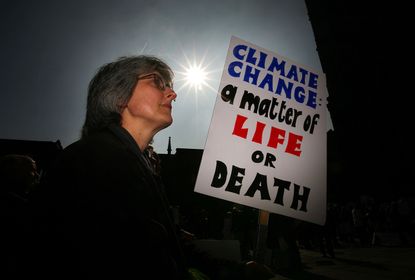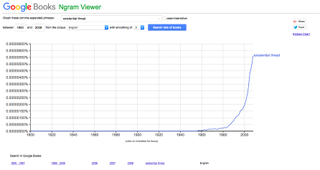Our dangerous addiction to political hyperbole
The more we shout, the less we hear. The more we exaggerate, the less we believe.


America's addiction to hyperbolic rhetoric is an existential threat to the United States.
Actually, it isn't. But putting it that way sure got your attention, didn't it?
And that, dear reader, is a big part of the problem.
Subscribe to The Week
Escape your echo chamber. Get the facts behind the news, plus analysis from multiple perspectives.

Sign up for The Week's Free Newsletters
From our morning news briefing to a weekly Good News Newsletter, get the best of The Week delivered directly to your inbox.
From our morning news briefing to a weekly Good News Newsletter, get the best of The Week delivered directly to your inbox.
We live during a time of extreme rhetorical inflation. Just in the past few days, the president of the United States has declared a national emergency about would-be immigrants attempting to cross the southern border into the United States. This situation isn't a national emergency at all, and the fact that previous presidents have made similar declarations doesn't make it any less egregious. He's also described discussions among members of the FBI and Justice Department about the possibility of invoking the 25th Amendment to remove him from office as a "coup" — even though the provision is part of the Constitution and the discussions were never acted on. Then there's the president's tendency to describe members of the media as "the enemy of the people."
But President Trump's love of demagogic exaggeration is just an especially prominent example of a much broader cultural trend. Consider the phrase "existential threat." It means, quite literally, a threat to the existence of something — a person, a country, a civilization, the world as a whole. As a Google Ngram of its appearance in books makes clear, the phrase was first invoked in the late 1950s and continued to be used minimally through the early years of the Reagan administration. It then shot up in frequency over the next two decades, with invocations rising even more dramatically from the turn of the millennium (and the September 11 attacks) through 2008, the last year for which data is available. We have every reason to suspect the invocations of "existential threat" have continued to rise over the past decade. Why? Because right now, multiple trends encourage hyperbolic pronouncements.

As historian Lisa Vox has written (in a book I had a hand in publishing), Americans have long been dawn to apocalyptic speculations, whether as an expression of religious faith or as outgrowth of secular and scientific anxieties. With American popular culture becoming omnipresent, the news cycle endless, and political disputes more heated and intractable, it's gotten increasingly difficult to be heard above the din. Hyperbole is the rhetorical equivalent of screaming at the top of your lungs in a room echoing with noisy arguments and teeming with seductive distractions.
The loudest, most distracting room of all — the 21st-century analogue to the ancient Athenian agora — is Twitter, where journalists, celebrities, politicians, activists, and a slew of anonymous troublemakers compete for attention and influence. And as I recently argued in another context, Twitter "puts every tweeter on a massive stage, with the nastiest put-downs, insults, and provocations often receiving the most applause." That creates a powerful incentive to go radical, speak in extremes, and exaggerate, which then provokes a reaction, and then a reaction to the reaction, and so on through endless iterations of hyperbolic reactivity.
Social media in general also empowers activists, who are no longer limited to organizing their crusades for justice in the specific places where they are physically present. Now every activist has the whole world as a potential audience and army of recruits to the cause. And as anyone who's observed activists at work knows very well, the staking out of strong, uncompromising, often exaggerated positions is how they go about accomplishing their goals.
The reason is obvious: They want to move public opinion in their direction, and they seek to get it with a rhetoric of alarmism. Opinion journalists have adopted this approach, in part for the same reason — because they think their best chance at persuasion is to indulge in intentional overstatement — but also because, once again, standing out in the clamorous marketplace, winning an audience and profit-generating online traffic, requires some attention-grabbing gesture.
That's how The New York Times' resident ideological moderate, David Brooks, managed to write a column last week that described China not as a rival or even an adversary of the United States on the world stage but as an "existential threat," as if Chinese President Xi Jinping were contemplating an imminent nuclear first strike on Los Angeles, New York, and Washington, D.C.
It's also how journalist David Wallace-Wells has managed to write a book about climate change that, to judge by the gripping excerpt published in The New York Times Sunday Review this past weekend (not-so-subtle title: "Time to Panic"), treats it as a literal existential threat — one that threatens to render the planet Earth uninhabitable. (The book's title is The Uninhabitable Earth: Life After Warming.)
Is Wallace-Wells right to adopt such overheated rhetoric? (No pun intended.) It's hard to say. The human consequences of global warming are bound to be severe if carbon emissions aren't drastically reduced. But are badly flooded coastal cities, scorching hot summers in the Middle East and Asia, stronger storms, and horrible forest fires a threat to the very survival of the human species? The planet has endured drastic temperature swings in the past. The human race has survived pandemics that have killed tens of millions. The Black Death alone killed roughly 75 million people at a time when the total world population was only 400-450 million. That's roughly equivalent to well over a billion people dying today. Will climate change kill that many? Even if it did, would that deserve to be called an existential threat to the human race when several billions more would survive?
The point isn't to belittle the dangers posed by climate change. It's to recognize that the best way to communicate those dangers to a skeptical public may not be to hype them. Wallace-Wells devotes a good part of his excerpt arguing that outright alarmism is the only way to rouse a deaf world to the perils that await us. I doubt it. More than anything else, that approach to persuasion resembles the exaggerations and distortions that many people associate with advertising, electoral campaigns, and, increasingly, political debate more generally — all of which regularly float hyperbolic claims that are all-too-easy to dismiss precisely because of how unhinged and partisan they sound.
And there we see the defining paradox of our time: The more we shout, the less we hear. The more we exaggerate, the less we believe. And the more we hype the truth as we perceive it, the less likely we are to think anyone else has anything valuable to say.
Create an account with the same email registered to your subscription to unlock access.
Sign up for Today's Best Articles in your inbox
A free daily email with the biggest news stories of the day – and the best features from TheWeek.com
Damon Linker is a senior correspondent at TheWeek.com. He is also a former contributing editor at The New Republic and the author of The Theocons and The Religious Test.
-
 'Good riddance to the televised presidential debate'
'Good riddance to the televised presidential debate'Instant Opinion Opinion, comment and editorials of the day
By Harold Maass, The Week US Published
-
 Caitlin Clark the No. 1 pick in bullish WNBA Draft
Caitlin Clark the No. 1 pick in bullish WNBA DraftSpeed Read As expected, she went to the Indiana Fever
By Peter Weber, The Week US Published
-
 Today's political cartoons - April 16, 2024
Today's political cartoons - April 16, 2024Cartoons Tuesday's cartoons - sleepyhead, little people, and more
By The Week US Published
-
 Arizona court reinstates 1864 abortion ban
Arizona court reinstates 1864 abortion banSpeed Read The law makes all abortions illegal in the state except to save the mother's life
By Rafi Schwartz, The Week US Published
-
 Trump, billions richer, is selling Bibles
Trump, billions richer, is selling BiblesSpeed Read The former president is hawking a $60 "God Bless the USA Bible"
By Peter Weber, The Week US Published
-
 The debate about Biden's age and mental fitness
The debate about Biden's age and mental fitnessIn Depth Some critics argue Biden is too old to run again. Does the argument have merit?
By Grayson Quay Published
-
 How would a second Trump presidency affect Britain?
How would a second Trump presidency affect Britain?Today's Big Question Re-election of Republican frontrunner could threaten UK security, warns former head of secret service
By Harriet Marsden, The Week UK Published
-
 'Rwanda plan is less a deterrent and more a bluff'
'Rwanda plan is less a deterrent and more a bluff'Instant Opinion Opinion, comment and editorials of the day
By The Week UK Published
-
 Henry Kissinger dies aged 100: a complicated legacy?
Henry Kissinger dies aged 100: a complicated legacy?Talking Point Top US diplomat and Nobel Peace Prize winner remembered as both foreign policy genius and war criminal
By Harriet Marsden, The Week UK Last updated
-
 Trump’s rhetoric: a shift to 'straight-up Nazi talk'
Trump’s rhetoric: a shift to 'straight-up Nazi talk'Why everyone's talking about Would-be president's sinister language is backed by an incendiary policy agenda, say commentators
By The Week UK Published
-
 More covfefe: is the world ready for a second Donald Trump presidency?
More covfefe: is the world ready for a second Donald Trump presidency?Today's Big Question Republican's re-election would be a 'nightmare' scenario for Europe, Ukraine and the West
By Sorcha Bradley, The Week UK Published